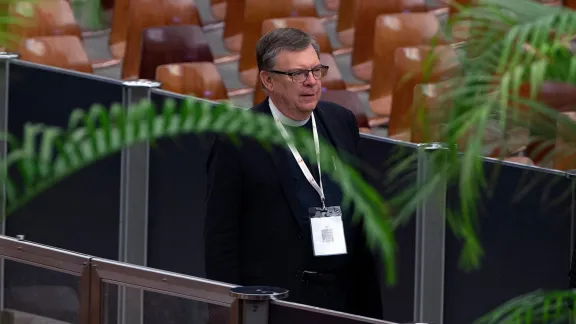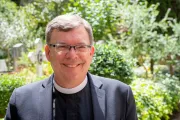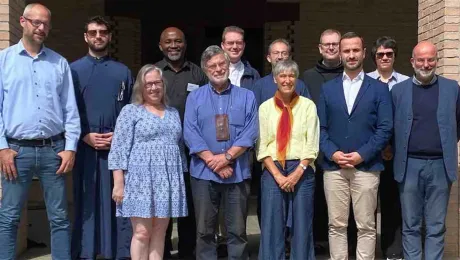
Assistant General Secretary for Ecumenical Relations Dirk Lange. Photo: CatholicPressPhoto/A. Giuliani
Reflection after the third week of the 2024 Synod of Bishops
The third week at the Synod on synodality focused primarily on the topics of pathways and places. The “conversation in the Spirit” moved from last week’s consideration of baptismal relationality and how the church is defined relationally to the ways through which these relations take specific and practical forms.
Pathways help define how relations are practiced. The first pathway is listening to the Word of God before any other listening to others can happen. Formation, especially catechesis, is essential. An important discussion on decision-making took place and how it is accomplished in a synodal church, involving the participation of the whole People of God.
New forms of community
The ensuing conversation on places was particularly insightful and consisted in what we would call contextual analysis. Urbanization is changing the places where and how we relate to one another. Traditional “places” are shifting. For example, the “parish” is no longer, in many cities and regions, the only place of community. Christian communities are varied and numerous. New forms of community emerge.
Then there is the phenomenon of human migration, whether forced or voluntary. People live in multiple “places” and identities, especially as a result of immigration. In this multiplicity of environments – contexts, platforms (including digital), cultures, and languages – a Gospel attentiveness to one another is needed. Accountability and transparency are key to maintaining relations. A deep sense of responsibility to our many neighbors in their great diversity is required.
Mutual responsibility
The LWF’s own process concerning mutual responsibility comes to mind. What does it mean to be a confessing communion of churches in multiple contexts with diverse social and cultural challenges and questions? Though Martin Luther did not use the term synodality, he considered mutual admonition and consolation as a mark of the church. Such mutual conversation is a profound listening to one another. It is engaging discernment together. It is about forging relations and finding pathways together. The church is recognized in part by how it listens to its members and to the neighbors around it, how it engages in conversation and discernment. A communion of churches is recognized by this same synodal process: how, through mutual responsibility, do we walk the path of discernment and proclamation of the Gospel together?
The question of relationality within current ecclesial structures was raised by the Synod participants. How, they wonder, can synodality be constitutive of the Church as suggested by Pope Francis? In Lutheran terminology this might be expressed in the following way: to what extent is synodality a “mark” of the church? Pyramidal structures of power and definitions of ministry (with the Roman Pontiff at the top of the pyramid) require reframing in a synodal process. It is exciting to see how this question is addressed by the Synod and also in ecumenical conversations. When ministry is defined (and lived) in a synodal way, mutual recognition may also become possible.
The fourth week will begin with a mini retreat before we engage in the hard work of producing a final document.



